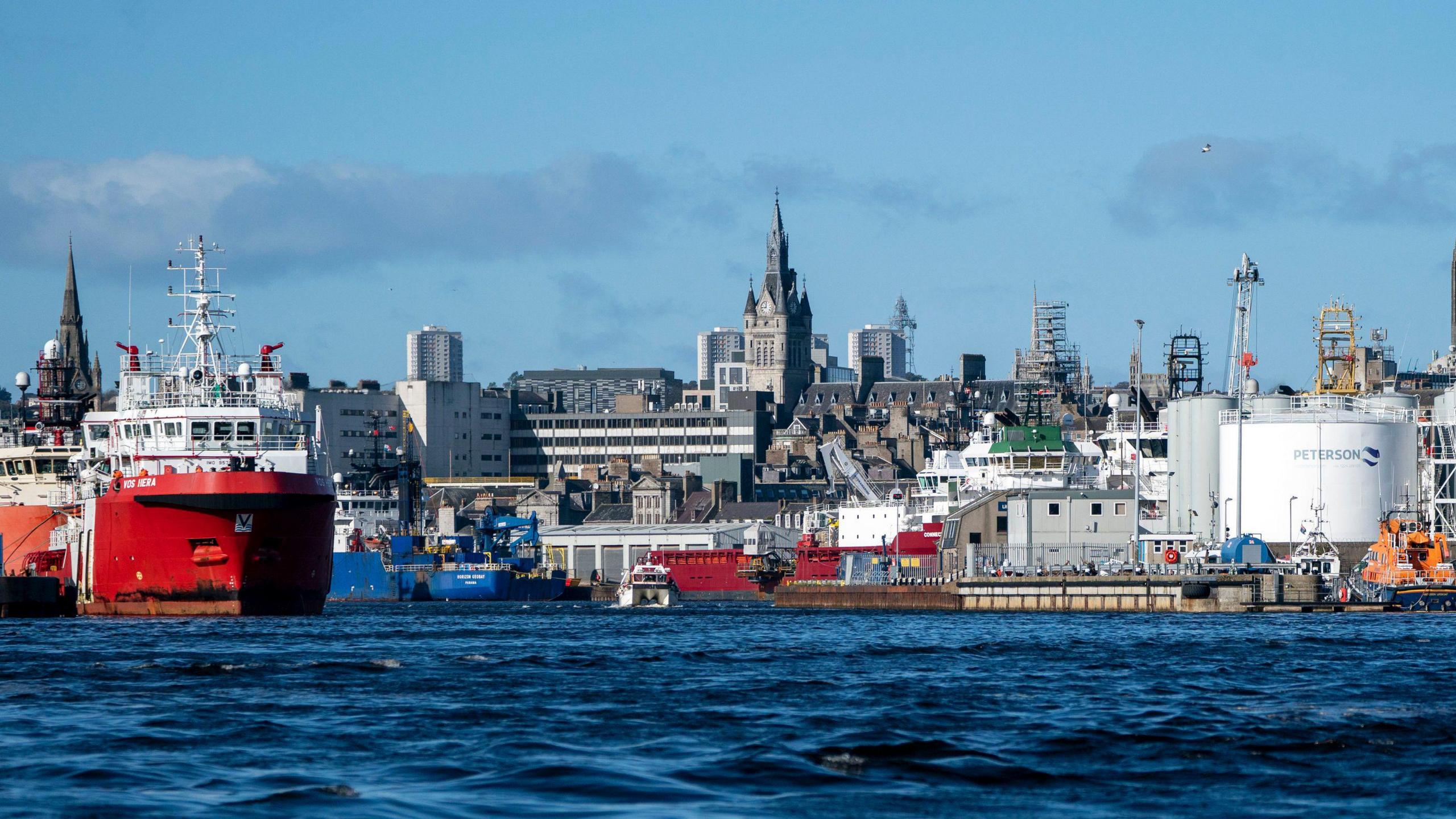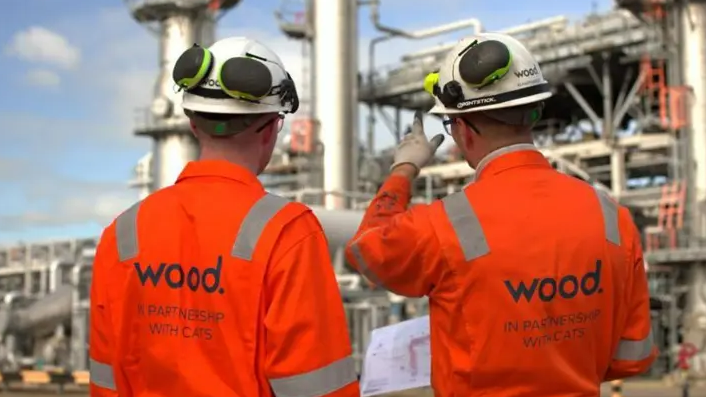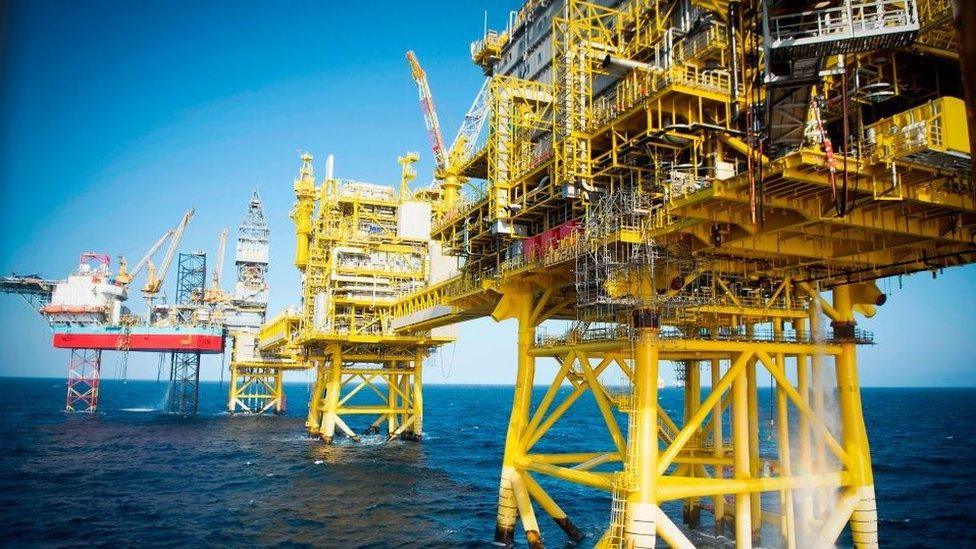Europe's energy capital: How the Budget's going down in Aberdeen

The city and port of Aberdeen are tied into the North Sea oil and gas industry
- Published
Aberdeen is an oil and gas city and has been for more than 50 years.
The city's port is filled with the busy traffic which services the North Sea industry. The skies above buzz with the helicopters which dart back and forth between the city's airport and the near 300 platforms which sit in the UK's waters.
The industry serving those is huge and covers all sectors from cutting edge technology through engineering and logistics to those firms which feed and water the workers offshore.
An estimated 200,000 jobs rely on what happens in the waters of the North Sea. That includes those who work in Aberdeen's pubs and hotels and even those who drive its taxis.
And that's why what was announced in Wednesday's Budget matters.
More North Sea drilling to be allowed in new Labour plan
- Published1 day ago
The news that there would be some relaxation of restrictions on new oil and gas drilling in the North Sea was something those in the sector could welcome.
A UK government review will allow small "tiebacks" - subsea links permitting extraction to go ahead in fields where existing oil and gas fields stray into currently-unlicenced areas.
That ought to help prolong the future of the sector, perhaps keeping people in skilled jobs while the UK economy moves its energy balance away from fossil fuels towards renewables.
It also brings UK ministers closer to their counterparts in Edinburgh, where the Scottish government has moved away from its earlier "presumption against" new oil and gas extraction.
But there was disappointment that the Chancellor made no move to scrap the Energy Profits Levy (EPL) - the so-called "windfall tax" - which was introduced by the Conservative government in 2022 following a boost in oil and gas profits caused by Russia's invasion of Ukraine.
It's due to stay in place until 2030 and there have been constant and repeated calls for it to be scrapped amid claims it's damaging the North Sea industry.

Mark Milne has owned the Spider's Web bar in Dyce for 36 years
Mark Milne is one of those Aberdeen business owners who, at first glance, doesn't seem connected to the oil and gas industry. But he is.
He's owned the Spider's Web pub for 36 years. It sits in the suburb of Dyce, on the north-west edge of the city. It's close to a heliport and is the first stop for many workers touching down after weeks offshore.
That leaves him well qualified to notice what's happening. To his own living and to his customers' businesses and jobs.
"We've seen a dip in the oil and gas customers and that's onshore and offshore. A lot of the oil offices that were here are not. There's a horrible example just along the road of a great office building torn down this week," he said.
"Those were all my customers. We do still get plenty of oil and gas people coming in but maybe not as many and, are they as confident to spend?".
Mark says this is a worry for him, his staff, his neighbours. "I speak to the hairdresser up the road. There's not the same people going through Dyce. It affects everybody."
He says "100%" of his oil and gas customers believe the UK government is not doing enough for the industry, both through the windfall tax and "the green issues, not allowing redevelopments and what have you".
"It's a great industry with a great future. It creates wealth, it creates jobs. Well-paid jobs. And it seems like the government is happy to see these things go," he said.

Energy Minister Michael Shanks MP was visiting Aberdeen after the Budget
On the day after the Budget, UK Energy Minister Michael Shanks was in Aberdeen, where his government has committed to basing the state-owned energy company Great British Energy.
Visiting an offshore training centre, he defended the importance of the ELP, which he said had raised £11bn for investment in public services.
He believes the oil and gas sector has to do its bit and contribute to the overall tax take.
But speaking to BBC Radio Scotland's Lunchtime Live, he said the problems being experienced in the North Sea could not be blamed on the ELP.
"This isn't a short-term transition that suddenly arrived in the North Sea. We hit peak oil and gas more than 20 years ago," he said.
"We've been a net importer since 2003 and we have lost more than 70,000 jobs in the past decade. So the idea that somehow this isn't a transition that isn't already underway, I think is quite wrong.
"Our plan as a government is to say: 'Look, oil and gas is hugely important and will be for decades to come. But in order to make sure that that this is genuinely a prosperous and just transition we also have to drive forward the investment in what comes next'.
"That means investment in offshore wind, carbon capture, hydrogen. But it also means making it as easy as possible for people to find those jobs."

David Larssen is concerned about the future of the oil and gas sector in the UK
Some of the loudest voices speaking out against the EPL are coming from the city's many boardrooms.
Davis Larssen is chief executive of global energy technology company Proserv.
They operate out of Europe, Asia, the United States and the Middle East. Their UK headquarters have been in Aberdeen for the past 50 years.
But he points out that where and how they do business is changing.
He told BBC Scotland News between 35-40% of the firm's workforce is based in the UK but the last two years has seen most of their work moving overseas.
"I think it's fair to say if we were starting with a blank piece of paper we would not put our HQ in Aberdeen," he said.
"We're here for historical reasons. We've got a lot of very valued employees here but we increasingly support clients all around the world so it obviously has been more difficult to continue with an HQ and with facilities in Aberdeen."
He blames the ELP for that change. He believes it has accelerated the decline of North Sea oil and gas and the UK government's decision to allow tiebacks is scant consolation.
"It could potentially help but it's a very, very small step in the right direction," he said.
Back in the Spider's Web pub, the answer for Mark Milne is simple.
"Take advantage of our natural resources. Drill baby, drill".
Related topics
- Published17 November

- Published17 October
